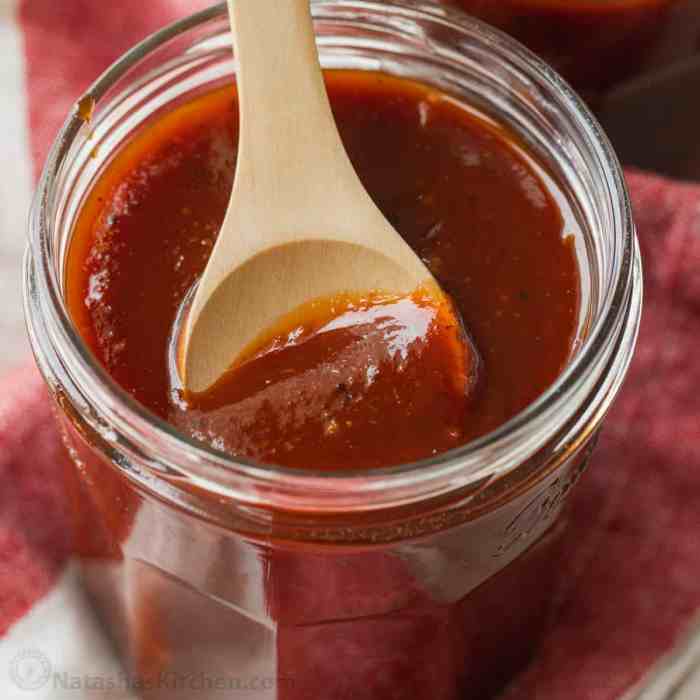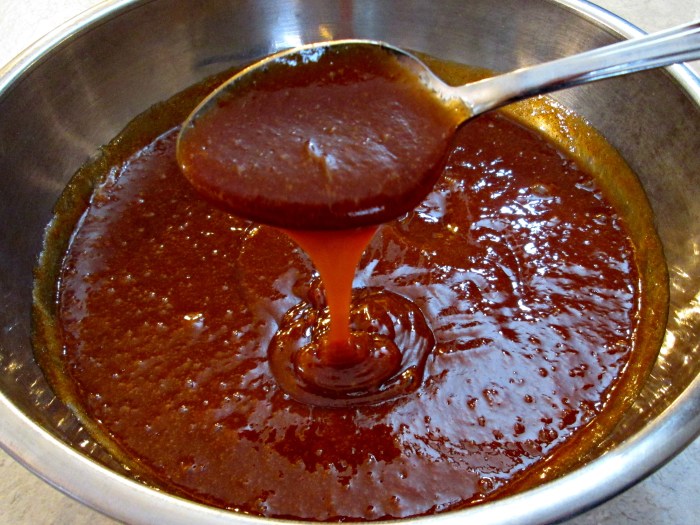Recipe for Homemade BBQ Sauce
A Deep Dive into Homemade BBQ Sauce

Source: tasteofhome.com
Recipe for homemade bbq sauce – Barbecue sauce, a culinary cornerstone of American cuisine, boasts a rich and varied history, evolving from simple vinegar-based concoctions to the complex, nuanced sauces we enjoy today. Its origins are deeply rooted in the Southern United States, where regional variations developed over centuries, reflecting the diverse influences of indigenous populations, European settlers, and enslaved Africans. This evolution has resulted in a condiment that is far more than just a side; it’s a flavor enhancer, a marinade, and a glaze, capable of transforming ordinary dishes into culinary masterpieces.
Introduction to Homemade BBQ Sauce, Recipe for homemade bbq sauce
The versatility of homemade BBQ sauce is unparalleled. It can be used as a marinade for meats before grilling, a basting sauce during cooking, or a finishing glaze to add depth and complexity. Beyond its culinary applications, making your own BBQ sauce offers significant advantages over store-bought varieties. You have complete control over the ingredients, ensuring freshness, quality, and the ability to tailor the flavor profile to your exact preferences.
This allows for experimentation with different sweeteners, spices, and vinegars to create a unique sauce that reflects your personal taste. Furthermore, homemade BBQ sauce often avoids the high levels of sodium and preservatives found in commercially produced versions.
Essential Ingredients and Their Roles

Source: natashaskitchen.com
The core ingredients of most BBQ sauces share a common goal: to create a balance of sweet, sour, and savory flavors. These typically include a sweetener (brown sugar, molasses, honey), an acid (vinegar, lemon juice), a tomato base (ketchup, tomato paste, diced tomatoes), and spices (paprika, garlic powder, onion powder, black pepper, chili powder). Each ingredient plays a crucial role in the overall flavor profile.
Sweeteners provide sweetness and body; acids add tang and balance the sweetness; the tomato base contributes umami and thickness; and spices offer complexity and depth of flavor. Different sweeteners offer varying degrees of sweetness and texture. Brown sugar provides a rich, caramel-like sweetness; molasses adds a deeper, more complex sweetness with a slight bitterness; and honey contributes a floral sweetness and viscosity.
| Ingredient | Substitution | Impact on Flavor |
|---|---|---|
| Brown Sugar | Honey | Increased sweetness, slightly floral notes |
| Apple Cider Vinegar | White Wine Vinegar | Sharper, less fruity acidity |
| Ketchup | Tomato Paste + Water | Thicker consistency, more intense tomato flavor |
| Worcestershire Sauce | Soy Sauce + Balsamic Vinegar | Savory umami, with a touch of sweetness and acidity |
BBQ Sauce Variations: Flavor Profiles
The beauty of BBQ sauce lies in its adaptability. Numerous flavor profiles can be achieved by adjusting the balance of sweet, smoky, spicy, tangy, and savory elements. Here are five distinct profiles with example recipes:
- Sweet BBQ Sauce: 1 cup ketchup, ½ cup brown sugar, ¼ cup apple cider vinegar, 2 tbsp Worcestershire sauce, 1 tbsp Dijon mustard, 1 tsp smoked paprika. Combine all ingredients in a saucepan and simmer until thickened.
- Smoky BBQ Sauce: 1 cup ketchup, ½ cup brown sugar, ¼ cup apple cider vinegar, 2 tbsp liquid smoke, 1 tbsp Worcestershire sauce, 1 tsp garlic powder, ½ tsp onion powder, ½ tsp black pepper.
- Spicy BBQ Sauce: 1 cup ketchup, ½ cup brown sugar, ¼ cup apple cider vinegar, 2 tbsp chili powder, 1 tbsp Worcestershire sauce, 1 tsp cumin, 1 tsp cayenne pepper.
- Tangy BBQ Sauce: 1 cup ketchup, ½ cup apple cider vinegar, ¼ cup brown sugar, 2 tbsp lemon juice, 1 tbsp Dijon mustard, 1 tsp garlic powder, ½ tsp black pepper.
- Savory BBQ Sauce: 1 cup ketchup, ½ cup Worcestershire sauce, ¼ cup soy sauce, 2 tbsp brown sugar, 1 tbsp molasses, 1 tsp onion powder, ½ tsp garlic powder.
Adjust sweetness by increasing or decreasing the amount of sweetener. Spiciness can be controlled by adding more or less chili powder or cayenne pepper. Smokiness can be enhanced by adding more liquid smoke or using smoked paprika.
Cooking Methods and Techniques

Source: poormansgourmetkitchen.com
BBQ sauce can be prepared using various methods, each impacting the final texture and flavor. The stovetop method offers quick preparation, while slow cooking yields a richer, more developed flavor. Smoking imparts a distinct smoky character.
- Stovetop: Combine all ingredients in a saucepan, bring to a simmer, and cook, stirring frequently, until thickened.
- Slow Cooker: Combine all ingredients in a slow cooker and cook on low for 4-6 hours or high for 2-3 hours, stirring occasionally.
- Smoker: Combine ingredients and simmer over low heat until slightly thickened. Then, place in a smoker for 2-3 hours to infuse smoky flavor.
| Method | Cooking Time | Texture |
|---|---|---|
| Stovetop | 20-30 minutes | Medium-thick |
| Slow Cooker | 4-6 hours (low) | Thick and rich |
| Smoker | 2-3 hours | Medium-thick, smoky |
Storage and Shelf Life
Proper storage is crucial for maintaining the freshness and quality of homemade BBQ sauce. Refrigerate in airtight containers for optimal shelf life. In the refrigerator, it should last for 1-2 weeks. Freezing extends the shelf life to 2-3 months. Look for signs of spoilage such as mold growth, off-odors, or changes in texture or color.
Serving Suggestions and Pairings
Homemade BBQ sauce is incredibly versatile. It pairs beautifully with grilled meats, poultry, and vegetables. It can be used as a marinade, basting sauce, dipping sauce, or glaze. Creative uses include adding it to pizza sauce, using it as a burger topping, or incorporating it into chili recipes.
Illustrative Examples of Homemade BBQ Sauces
Here are three distinct homemade BBQ sauce recipes, showcasing the diverse flavor profiles achievable:
- Classic Tangy BBQ Sauce: This sauce features a vibrant red color, a slightly thin consistency, and a tangy aroma with hints of vinegar and spices. The taste is balanced, with sweetness from brown sugar offset by the sharp acidity of apple cider vinegar.
- Smoky Chipotle BBQ Sauce: This sauce is dark brown with flecks of chipotle peppers, possessing a thick, syrupy texture. The aroma is intensely smoky with a hint of chili heat. The flavor is rich and complex, blending the smokiness of chipotle peppers with a deep sweetness and a pleasant kick of heat.
- Sweet and Savory Bourbon BBQ Sauce: This sauce is a deep amber color with a medium-thick consistency. It has a rich aroma of bourbon, brown sugar, and molasses. The flavor is complex, balancing the sweetness of brown sugar and molasses with the savory depth of bourbon and a subtle hint of spice.
Questions and Answers: Recipe For Homemade Bbq Sauce
Can I use a blender to make BBQ sauce?
Yes, a blender is a great option, especially for achieving a smoother consistency. Just be cautious when blending hot liquids.
How long does homemade BBQ sauce last in the refrigerator?
Properly stored in an airtight container in the refrigerator, homemade BBQ sauce generally lasts for 2-3 weeks.
What are some signs that my BBQ sauce has spoiled?
Signs of spoilage include mold growth, a significant change in color or texture, and an off-putting odor.
Can I freeze homemade BBQ sauce?
Yes, freezing extends the shelf life considerably. Allow it to thaw completely in the refrigerator before use.














